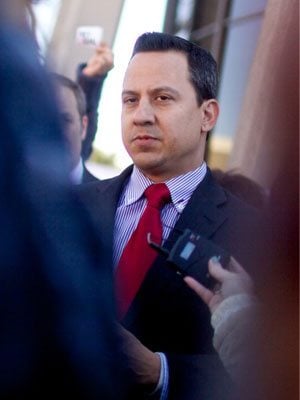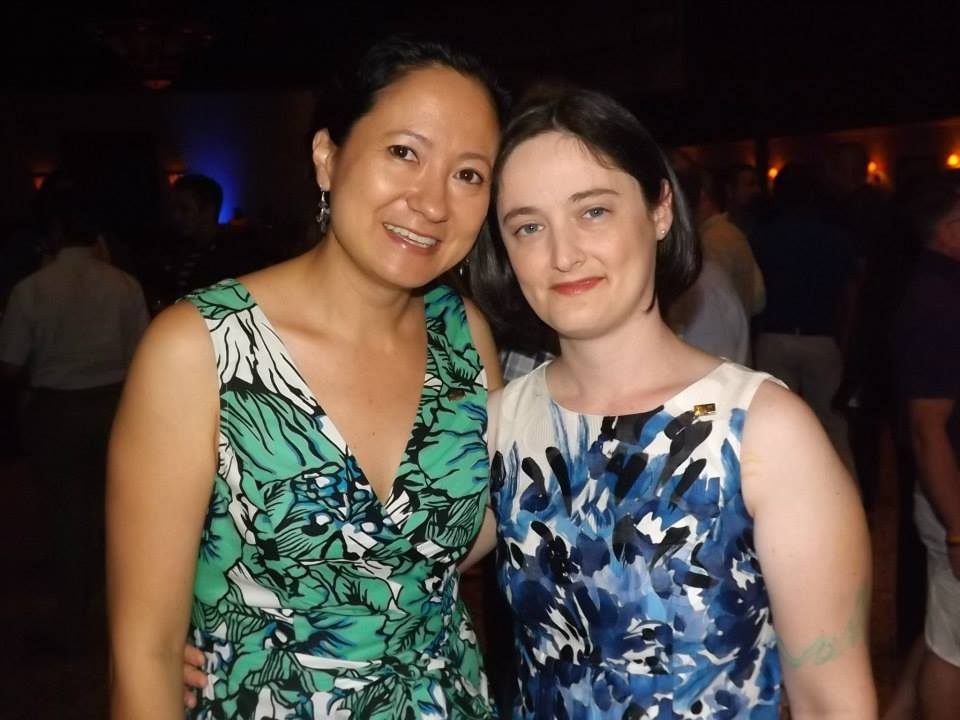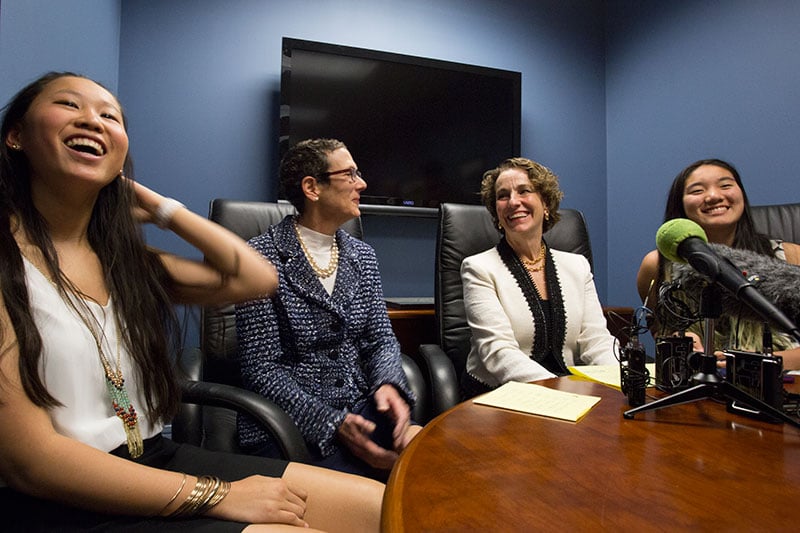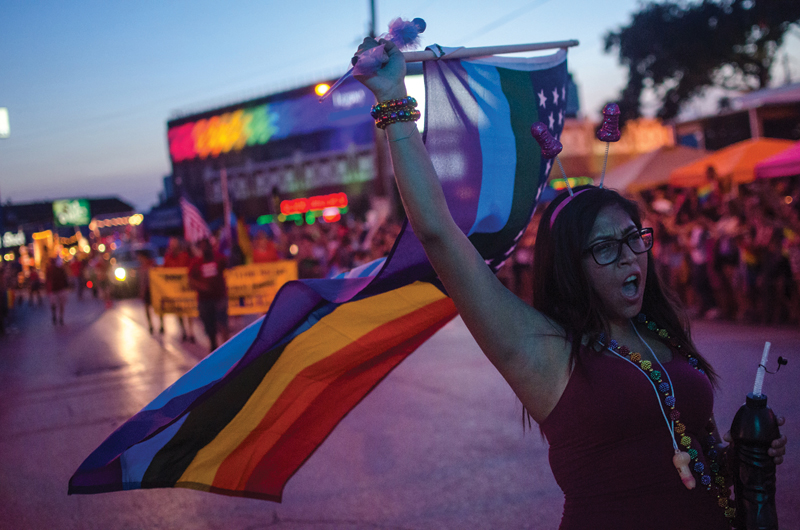
Up Against Homophobia
In Queer Brown Voices, LGBT activists chronicle their overlooked struggle.
A version of this story ran in the October 2015 issue.
In the wake of the long-awaited nationwide legalization of gay marriage, we can expect a bounty of books chronicling and celebrating LGBT activism, past and present. Yet none will be quite like Queer Brown Voices, which interweaves the traditions of testimonio and institutional history in a collection of 14 personal essays and oral histories that demonstrate how lesbian, gay, bisexual and transgender Latina/o activists helped shape the LGBT movements of the 1970s, ’80s, and ’90s. The anthology is motivated in part by the editors’ desire to remedy accounts that have relegated queer brown efforts to the margins of LGBT history, despite the fact that a number of Latinas/os were fighting for LGBT causes well before more widely known white leaders, like Harvey Milk, became active.
To put the importance of this collection — and the Latina/o activism it documents — in perspective, consider this: Until the 2003 Lawrence v. Texas Supreme Court ruling, Texas and 13 other states still had so-called sodomy laws on the books. The Lawrence v. Texas case had important precedents, including a 1992 challenge against the Texas law with a Latina as the lead plaintiff.
Queer Brown Voices includes accounts of the founding of Latina/o LGBT groups in Texas cities and reveals the central role Texans played in creating a national Latina/o LGBT organization. Personal experiences are equally important in Queer Brown Voices, and most chapters engage in some way with the quest to become, as influential East L.A. lesbian activist Laura M. Esquivel explains, “100 percent Latina/o and 100 percent gay.”
A clear thesis emerges from the collected narratives: Queer brown experiences cannot be understood solely in terms of Latina/o identity or LGBT identity. Rather, the intersections between these identities shape both the discrimination that the contributors faced and their experiences with activism. Activist efforts represented in the collection include organizing support groups, facilitating consciousness-raising sessions, pursuing political causes, fighting discriminatory practices, performing cultural outreach, and translating AIDS treatment and drug information into Spanish. As represented in the collection, queer brown activism is a double-pronged endeavor, one that simultaneously works to increase acceptance within the Latina/o community and raise the profile of Latina/o concerns within the mainstream LGBT community.
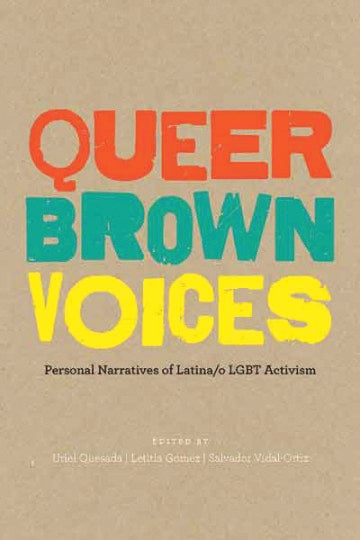
Edited by Uriel Quesada Letitia Gomez and Salvador Vidal-Ortiz
University of Texas Press
264 PAGES; $24.95 (PAPERBACK)
$75.00 (HARDCOVER) University of Texas Press
The creation of Queer Brown Voices is itself a kind of activism; it renders visible the challenges faced by Latina/o queer communities in decades past as well as their robust efforts to pave the way for a more just future. For Latinas/os, coming out had a real cost, one often paid on the family front. For Jesús Chaírez, who hosted the influential Dallas LGBT Latina/o radio show Sin Fronteras for more than a decade, coming out meant being excluded from family events. Luz Guerra and Mona Noriega discuss the prejudice faced by Latina lesbian mothers, who not only contended with the widespread belief that lesbianism might harm their children but also often lost custody because of it. Discrimination was also common within white LGBT spaces. A number of mainstream LGBT organizations and social groups excluded Latinas/os from leadership positions, and minorities also faced discrimination in gay bars with white management.
Being turned away from a bar might not seem particularly dire to some, but as Houston activist Dennis Medina notes, in LGBT communities of the second half of the 20th century, the bar scene “was your only outlet. … That was your universe.” LGBT Latina/o organizing arose in part to create a social home for gay and lesbian Latinas/os. Bailes and comidas sponsored by Latina/o groups offered an alternative to the bar scene, and they also created valuable opportunities for organizing and gathering support for a wide range of causes. In Texas, LGBT Latina/o activists lobbied for immigration reform and better conditions for migrant farm workers, protested police brutality against minorities, pursued political representation, and, with the arrival of the AIDS epidemic, demanded greater access to drug information and treatment for affected Latinas/os.
The creation of Queer Brown Voices is itself a kind of activism; it renders visible the challenges faced by Latina/o queer communities in decades past as well as their robust efforts to pave the way for a more just future.
Sometimes these efforts were met with what Gloria A. Ramirez calls “Texas-sized homophobia” in her chapter documenting the “queer roots” of San Antonio’s Esperanza Peace and Justice Center, where she has been active since its founding. In particular, Ramirez describes how the 1990s brought an intensification of negativity directed at the San Antonio LGBT community. Critics railed against events sponsored by the Esperanza Center, which had a history of supporting LGBT activism. The opposition became more aggressive in response to a lesbian film festival and an art show that featured lesbian and gay artists. Speaking of the early days of the center, Ramirez recounts vandalism of the facilities, obscene phone calls, death threats, and even “a feces-covered bra being hung on one of Esperanza’s pear trees.” Perhaps even more distressing than homophobic attacks was the antagonism from some members of the white LGBT community, who joined the religious right in pressuring the San Antonio City Council to defund the Esperanza Center. The center’s opponents succeeded in 1997, but funding was restored after a court order in 1998. The center continues to pursue its mission today.
The narratives in Queer Brown Voices occasionally grow dense with acronyms, procedural details and particulars of organizational strife, but these moments remind us that progress on social issues often depends on the healthy functioning of grassroots organizations. Similarly, these accounts, which were composed separately, exhibit repetitions that become compelling because they fit the memories of individuals into a pattern of collective experience.
Queer Brown Voices documents the Latina/o queer community’s encounters with homophobia and intolerance from fellow Latinas/os as well as racial and ethnic marginalization in mainstream LGBT circles. More importantly, it highlights the accomplishments of activists organizing against this oppression. Medina recalls the early days of striving with other activists to find “a space, a place or a crack, where we could insert ourselves.” Thanks to the work of Latina/o LGBT activists in Texas and beyond, he concludes, “that crack, that space, is larger now.”
